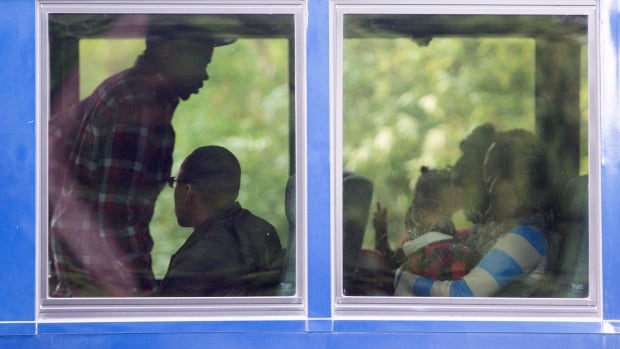Seeking Haven in Canada, Fleeing America
"It's unheard of. In thirty years, I've never sen this kind of volume or intensity."
"We're doing our best, but obviously there's going to be a limit. And we're close to that limit."
"But I don't think anybody has the answers. Nobody knows when it's going to stop At one point I think the government will have to make a decision -- do we continue to receive them [refugee claimants], and if we do, where are the resources going to come from?"
Francine Dupuis, PRAIDA, (Programme Regional D/Accueil et d'integration des demandeurs d'asile)

The 2016 American presidential election has seen a huge destabilizing effect on the refugee illegals that have penetrated America in their millions as undocumented migrants. It has long been recognized that these people fleeing instability in their home countries of violence, governmental oppression, poverty, regional conflicts and outright criminality and corruption ensuring that those populations will remain in dire straits with little hope to realize their future aspirations have become a burden to the United States.
In the United States they live a furtive, fearful existence as an underworld of people with an illegal presence, working low-paid jobs and taken advantage of by employers while desperately attempting to make a place for themselves where they can feel secure and part of a society they aspire to join legally, without the means to do so. Occasional amnesties with conditions help some, but the vast majority remain vulnerable to discovery and deportation. Children born in the United States to illegal migrants live an abortive life of insecurity.
Into this chaos came a new president with no experience whatever in the administration of a large economy, national institutions, international influence and power clearly unequal to the task at hand but declaring his intention to rid the country of the presence of illegals. The result has been utter upheaval with those illegally in the United States on the brink of desperation, unwilling to leave, hopeful they might continue undiscovered and unmolested, while others led by fear, attempt to find haven in Canada across the border from the U.S.
Thousands of people hailing from Central America, Mexico, the Middle East, Africa and elsewhere have fled in desperation hoping to be able to declare themselves refugees in Canada, despite an agreement between the two countries that the first country of refuge will be the one to cope with them. Suddenly, Montreal is confronted with the realization that thousands of refugee applications are flooding in from Haitians seeking haven in Canada.
 |
| Still from video |
Montreal has a long-established and large expatriate Haitian community. Canada has had a long association with Haiti, sending that unfortunate nation international aid in efforts to help its economy and its people. But it was the United States that had another kind of association with Haiti over the years initially when the U.S. military occupied the country, then when the brutal dictator Papa Doc Duvalier ruled it, followed by his equally corrupt son, when Haiti was of investment interest to the U.S.
Haitians have become so well integrated in Montreal, with French as their national language (as a former French colony) along with Creole that they felt perfectly comfortable being part of French-Canadian culture. Michaelle Jean, a Haitian-Canadian journalist and television personality was named to the post of Governor-General from 2005 to 2010, where she distinguished herself before joining the staff of the United Nations. These connections no doubt encouraged Haitian refugees living in the U.S. and fearful of deportation, to claim refugee status in Canada.
Their temporary resident status in the United States was a concern for revocation under President Trump's refugee policy, leading them to begin crossing the border into Quebec, where in July alone PRAIDA, a program set up to help refugees in Quebec funded by government, was receiving requests averaging four times more than normal on a monthly basis. President Trump's threat to withdraw temporary protected status for 60,000 Haitians in the U.S propelled them to begin migrating toward refugee status in Quebec.
 |
| Asylum seekers board a bus after crossing the border into Canada from the U.S. at a police checkpoint close to the Canada-U.S. border near Hemmingford, Que., on Thursday. (Paul Chiasson/Canadian Press |
"They've been panicking. They're vulnerable people who do not want to return to Haiti because of how difficult a situation it would be for them They prefer to try their chances in Canada", explained Marjorie Villefranche, director general of the community centre Maison d'Haiti. Haiti had undergone a catastrophic earthquake in 2010, completely destabilizing the country. UN Nepalese peacekeepers had brought with them Cholera, and an outbreak has since further devastated the country.
The aid that PRAIDA offers of medical, nursing and psycho-social services is being overwhelmed by the sheer numbers having to be accommodated, in schools, rehabilitation centres, hotels and YMCAs. The practicalities of providing a place to sleep, food preparations, hygiene care taken care of is all overwhelming the service agency.
For many Haitians in the U.S., the only hope
of avoiding deportation to Haiti is coming to Canada. But the future
here is uncertain, too. (Charles Contant/CBC)
Labels: Canada, Haiti, Refugees, United States

<< Home